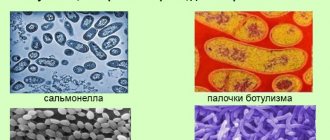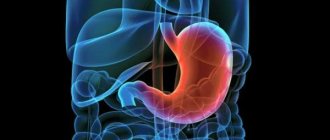Types and forms of the disease
This disorder is conventionally divided into organic and functional. Organic indicates disturbances in the gastrointestinal tract, functional indicates pathological changes in the stomach and intestines.
Ailments are divided according to types and causes. If dyspepsia is caused by a lack of digestive enzymes, it is divided into gastrogenic, enterogenic and pancreatogenic. If caused by an intestinal infection, it is divided into dysentery, intoxication dyspepsia and salmonellosis. If we are talking about the non-digestion of a specific product, a fermentative form is isolated, putrefactive or yeast, fatty or soapy.
Fermentation form
This form of the disorder is caused by excessive consumption of foods, which include legumes, cabbage with fruit, and honey with kvass. Subsequently, acidophilic flora is formed in the intestines, which causes discomfort.
The main features of this form are:
- bloating;
- frequent release of gases;
- frequent urge to defecate;
- the stool is foamy, with a characteristic sour odor.
In this case, abdominal pain is absent or mildly expressed. If we examine feces in laboratory conditions, it contains many starch grains, iodophilic microbes with organic acids and fiber.
The patient does not suffer much from his condition. The solution to the problem in this case is to follow a diet. Ignoring the problem leads to the emergence of a chronic form, which can develop into chronic enteritis, enterocolitis.
Putrid form
The yeast form of dyspepsia is characterized by a disturbance in the breakdown of elements. A decrease in the level of secretion of enzymes such as pepsin and trypsin leads to incomplete protein breakdown. This process is accompanied by the release of methane, hydrogen sulfide, skatole and indole, which irritate the intestines.
This form manifests itself through:
- weaknesses;
- decreased appetite;
- bloating;
- dizziness;
- dark-colored stool with a putrid odor.
Long-term course of the disorder can lead to chronic hepatitis with colitis, enterocolitis.
Fat form
Soap or fatty forms of dyspepsia are less common. Occurs when consuming large amounts of fatty foods. This disorder is associated with impaired fat breakdown - the lipolytic function of the pancreas cannot cope with its work. This may also be caused by a disruption in the flow of bile into the intestines, and the rapid passage of food through the small intestine.
Answers on questions
Most likely, a stake in the stomach indicates the presence of heaviness in the upper abdomen. Common causes of discomfort, discomfort and heaviness in the stomach area:
- binge eating;
- food poisoning;
- gastritis or peptic ulcer;
- functional stomach disorder.
If the cause of food stagnation in the stomach is overeating, then it is necessary to reduce the volume of subsequent portions and temporarily avoid eating fried, spicy and fatty foods. You can relieve discomfort with the help of antispasmodics (No-spa) or antacids (for example, Phosphalugel). It is worth noting that taking pancreatic enzyme preparations (Mezim, Pancreatin) will not affect the condition of the upper gastrointestinal tract in any way.
If the patient is diagnosed with gastritis, then treatment consists of taking antibiotics, antisecretory drugs (Omeprazole) and following a diet. Therapy lasts 2 weeks, after which, after 14 days, gastroscopy is repeated.
When the stomach gets stuck, it is very unpleasant. However, this does not pose a threat to life and health in the short term. The answer to the question of what to do in such situations depends on the patient’s well-being and the reasons that led to the gastrointestinal tract not working. The best solution is a visit to a medical facility to make a diagnosis and determine further treatment tactics.
We recommend that you read: Probiotics and prebiotics during pregnancy.
Editor: Alexandra Nikiforenko All experts Edited articles: 49 View all articles by the author
How is gastric endoscopy performed at the Otradnoye Polyclinic? In most cases, endoscopic examination is performed under sedation.…
What does high acidity harm? All indicators should be normal. If there is a lot of acid, then the food will not...
Functions and properties of hydrochloric acid Gastric juice is a solution with a complex chemical composition, consisting of ...
If the body does not take food, this causes many unpleasant moments and can signal a serious illness. This situation can occur at any age. It is not always possible to see a doctor right away, so it is advisable to know how to act in this case. Why does the body suddenly refuse to take food? How to fix it?
October 18, 2016
Why does the stomach not digest food?
Common reasons for problems with digestion of food are:
- slow metabolism;
- insufficient amount of enzymes involved in the breakdown of substances;
- the presence of diseases associated with the gastrointestinal tract;
- harmful bacteria are present on the mucous membranes of the stomach and intestines;
- pregnancy;
- alcohol abuse;
- improper and unbalanced diet;
- non-compliance with daily routine and meals.
Hyperthermia
Overheating of the body. Occurs at maximum tension of physiological mechanisms of thermoregulation (sweating, dilation of skin vessels, etc.). When the body heats up to a temperature of 41-42 ̊C, heat stroke occurs, accompanied by loss of consciousness, shortness of breath, weakness in the body, nausea and vomiting.
Well, in the end I would like to separately mention nausea and vomiting in pregnant women. This topic has long been the talk of the town and an endless source of jokes and anecdotes. No one can say exactly why pregnant women experience nausea and vomiting. Doctors tend to explain this phenomenon with the vague term “hormonal disorder,” but as you know, vomiting during pregnancy can begin due to anything: from the strong smell of perfume to a violent scene in an action-packed movie.
The human body's need to obtain energy through food can only cease due to a disruption in its condition due to illness, sleep problems or severe stress. If a person does not enjoy life, then his appetite disappears over time. Food in his eyes begins to look like a way to continue an uninteresting life, and therefore eating it loses its meaning for him. How does reluctance to eat food appear? Apathy towards food, along with indifference to the whole world, occurs in a person during depression. If a person in a stressful situation cannot find a place for himself and eats food uncontrollably, then with depression the situation is diametrically opposite.
The content of the article:
Signs of poor digestion
When food is not digested by the stomach, this event is accompanied by the following symptoms:
- painful sensations in the abdomen;
- feeling of heaviness in the abdomen;
- nausea;
- vomit;
- dizziness;
- weakness;
- defecation disorders in the form of diarrhea;
- lack of appetite.
Lack of appetite
When the stomach functions abnormally, a whole range of unpleasant symptoms arise, including lack of appetite. There is no appetite because the body is busy processing previous food. Since for some reason this process is difficult, the feeling of fullness may be present throughout the day, and if pathology is present, appetite may be absent for a long time.
Heaviness in the stomach
The feeling of heaviness is associated with stopping the process of breaking down food. The symptom of a stone in the stomach, which is uncharacteristic for a healthy person, can last up to several hours. In the absence of serious pathology, this phenomenon goes away without a trace.
Pain inside the abdomen
Pain is felt in the epigastric area, which worsens the already poor state of health. They can be short-term or last up to several hours. It depends on what problem or disease provoked the pain syndrome.
Nausea and vomiting
If you feel sick after eating, there can be many reasons for this. Depending on the accompanying symptoms and factors, this phenomenon can be assessed differently. Nausea and vomiting are protective reactions to eating stale food. This also happens if you have eaten a lot of fatty or meaty foods and overeating has occurred. Overheating, intoxication with tobacco smoke and other unpleasant odors increase nausea.
Diarrhea
Depending on what caused the disruption to the normal functioning of the digestive system, diarrhea can last up to several days. The most common reasons that provoke diarrhea are overeating, the presence of fatty foods in the diet, failures in the production of enzymes for digesting food, accelerated peristalsis, stress and dysbiosis.
Temperature increase
Due to the fact that the stomach cannot cope with the processing of food, it stagnates, ferments or rots. If this process is started, the body begins to fight harmful bacteria that could provoke this process or arise during the process of decay. This may be accompanied by an increase in body temperature.
Causes of dyspepsia
It often happens that food stays in the organ for a long time and is not digested due to overeating, snacking on the go, eating the wrong foods, eating a bad combination of foods, or chronic diseases of the gastrointestinal tract. Digestion can also be affected by stress, depression, and daily worries for any reason.
One of the factors in the development of dyspepsia is a late, hearty dinner that includes fatty, high-calorie foods. Like the entire body, the stomach must rest at night and those foods that it did not have time to digest during the evening remain until the morning, which is why after waking up you may feel discomfort in the abdomen, bloating, heartburn or nausea.
The reason for food retention in the organ may also be a poor reaction of the sphincter, which connects the organ to the intestines. The reaction may be impaired due to the presence of an ulcer or injury, which is caused by too much acid in the stomach. Therefore, with such a disorder, the patient often has a history of complaints of nausea, belching and vomiting.
There are also the following reasons why food is poorly digested:
- insufficient secretion of gastric juice;
- presence of gastritis;
- infection of the mucous membrane (presence of bacteria);
- disrupted metabolic process.
The cause of a painful sensation in the stomach may be poor nutrition. Insufficient secretion of gastric juice may be due to hormonal imbalance (often in pregnant women) or due to impaired functionality of the secretory gland, which is responsible for the secretion of juice. Therefore, in any case, it is necessary to perform fibrogastroscopy for diagnostic purposes to identify the cause of the pathology.
The presence of a sour taste in the mouth indicates the presence of an ulcer or gastritis. This is accompanied primarily by a decrease in appetite.
How to help your stomach digest food
In order for the stomach to begin to function normally, it is worth finding out the cause of the failure. If this happened once and did not happen again, there is no need to worry. If gastric constipation occurs periodically, you need to consult a doctor who will prescribe treatment and diet.
Nutritional Features
To restore stomach function, you should follow some nutritional recommendations:
- eat food in small portions;
- chew food thoroughly;
- do not drink a lot of liquid before meals;
- practice separate nutrition (take protein and carbohydrate foods separately from each other);
- Do not eat near the TV or on the go.
In addition, dishes should look appetizing, as this helps the secretion of gastric juice. This is especially true if the cause of gastric stoppage was insufficient enzyme levels. If we are talking about fermentative dyspepsia, it is worth excluding carbohydrates from the diet for several days. After two days, increase the consumption of proteins in the form of cottage cheese, chicken breast, turkey and boiled fish. You can include meat broth and some white bread. Afterwards, you can eat porridge cooked in water, drink fruit jelly and eat fruit puree.
If putrefactive dyspepsia is diagnosed, they fast for the first day and then eat carbohydrates for the next day. You can also eat crackers for 2-3 days, drink fruit juices and eat apples in quantities of up to one and a half kilograms. Next, add rice and semolina porridge, also boiled in water. You can start adding meat and fish to your diet only after 5-7 days of the diet.
Fatty dyspepsia requires restrictions in the form of fatty foods and carbohydrates. Include cottage cheese (low-fat), boiled fish and lean meat. Transition to your previous diet gradually, eliminating frequent consumption of fatty foods.
Drug therapy
Depending on the cause of the disorder, the list of prescribed medications may vary. The main unpleasant symptoms are relieved with the help of antispasmodics, enzyme preparations, histamine blockers and proton pump blockers.
The former eliminate pain, making you feel better; enzyme preparations stimulate the digestive process in the stomach and duodenum. Histamine blockers work to reduce acidity, and the latter are taken to eliminate sour belching and heartburn.
Step-by-step instructions for starting a stomach
To restore gastric motility impaired by overeating or poisoning, you should adhere to the following rules:
- eat small portions (2-3 tablespoons) at short intervals (2-2.5 hours);
- increase the amount of food eaten only gradually as the unpleasant symptoms disappear;
- exclude fresh baked goods, smoked meats, legumes, fresh fruits, and fast food from the diet for a while;
- ensure sufficient drinking regime (drink small and often, up to 1.5-2 liters per day);
- use medications as prescribed by a doctor: sorbents (Smecta, Atoxil), prokinetics (Domperidone), antacids to protect the gastric mucosa (Phosphalugel, for example);
- physical exercise is possible only in the absence of vomiting, high fever and in a relatively satisfactory condition of the patient.
You need to induce vomiting by pressing on the root of the tongue. This will clear the stomach of food and toxins that have stagnated in it. The procedure is not recommended for high systemic pressure, during an exacerbation of gastric ulcer, or in the presence of varicose veins of the esophagus.
Features of diagnosis for indigestion of food
At the first stage of diagnosis, the specialist collects data on the intensity of pain, location of discomfort and accompanying symptoms. Examines the patient and palpates the abdomen.
Next comes a series of instrumental diagnostic methods such as ultrasound or computed tomography and electrogastroenterography. The latter method allows you to monitor intestinal motility and detect disorders. X-rays are performed if a tumor is suspected. Diagnostics of the surface of the organ is carried out using an endoscope. In addition, blood and urine tests are taken.
Characteristics of vomit
An important indicator of the state of the digestive system is the characteristics of vomit, by the nature of which the doctor can already determine a preliminary diagnosis. Vomit, depending on the disease, can be:
- with streaks of fresh blood - such a clinical picture is given by gastric bleeding, due to a rupture of a blood vessel during a peptic ulcer, a malignant tumor of the stomach, cirrhosis of the liver, polyps, as a complication during treatment with hormonal drugs. This is an acute condition that threatens the patient’s life and requires immediate hospitalization of the patient;
- dark-colored vomit - vomiting occurs when there are problems in the absorption of certain dark-colored foods or medications, for example, activated carbon. It is quite rare. Sometimes the dark color of the vomit is a reaction to general anesthesia;
- vomit of undigested food - typical for food poisoning, allergic reactions to a food allergen;
- vomit mixed with bile - characteristic of cholecystitis and pancreatitis;
- the natural color of gastric contents is characteristic of overeating, or if the gag reflex is provoked by a stressful situation.
Preventing poor stomach digestion
If your stomach cannot cope with digesting food, you should follow preventive measures, which include:
- limiting the consumption of fatty and spicy foods;
- reduce salt intake;
- exclude adherence to strict diets;
- give up fast food;
- reduce sweets in your diet;
- eliminate bad habits;
- avoid stress;
- undergo regular examinations.
Digestive problems can be resolved on your own or by consulting a doctor. In most cases, they occur one-time, but frequent occurrence of ailments requires consultation with a specialist.
What is important to know about your stomach:
Why does the body refuse to take food?
If any food causes vomiting, this indicates a disturbance in the functioning of the stomach. Malaise can be due to various reasons, including:
- poisoning with low-quality products, gastritis and stomach ulcers have similar symptoms and are accompanied by food rejection. If you have problems with the pancreas and gall bladder, you also feel bitterness in your mouth;
- often appendicitis is accompanied by abdominal pain and vomiting;
- severe emotional stress sometimes causes a similar condition;
- food aversion may be caused by taking certain medications;
- when overeating and a large dose of alcohol, the overloaded stomach spontaneously clears itself;
- this may be a side effect of the flu or a tumor in the head;
- if you get motion sickness, then any trip causes nausea;
- With bulimia, girls induce vomiting in fear of gaining weight.
All reasons can be quite serious. Only a doctor can deal with them after an examination.
Aversion to food in a child, causes, symptoms and signs of what problems and diseases?
A child’s reluctance to eat any food can be a separate topic for discussion. First of all, because baby food has its own nuances. Your baby's taste preferences, as well as loss of appetite or refusal to eat healthy foods that he does not like, can greatly affect the child's health and development. Many parents wonder why a little person is so picky about food? The answer lies in the age characteristics of the child’s body. The first years of a small person’s life are associated with the restructuring of the intestines, the development of immunity, the appearance of baby teeth, and the determination of the boundaries of his taste and smell. Such changes, together or separately, are accompanied by frequent pain, apathy, and irritability. Due to discomfort, the child loses appetite and refuses food. A child’s unpleasant associations with food can also be caused by the monotony of food offered, coercion to eat, lack of attention to his tastes, stale or poorly prepared dishes. Preventing indigestion in a baby requires attention and patience from parents, as well as efforts to prepare not only healthy, but also attractive-looking food.
Causes of aversion to food, why did aversion to food, nausea and vomiting appear?
If the problem is no longer a one-time problem and brings you frequently recurring discomfort and a deterioration in the general condition of the body, to find the cause of the ailment, you should go to a medical facility and undergo an examination recommended by a doctor. In some cases, a comprehensive medical examination is required with the following sequence of specialists: therapist, gastroenterologist, endocrinologist, neurologist, psychotherapist. If possible, it would also be a good idea to consult a nutritionist.
A change in appetite towards deterioration is provoked by many factors. Among them:
- toxicosis; occurs in the early stages of pregnancy, food poisoning, medicinal and chemical origin;
— malfunctions of the digestive system: gastritis, colitis, duodenitis, abnormalities in the functioning of the liver, pancreas and gall bladder;
- allergies to food, household items or medications;
- worms (especially if there are animals in the house);
- a number of internal diseases, for example, lupus or rheumatoid arthritis;
- hormonal imbalance (disturbances in the functioning of the pituitary gland, hypothalamus, thyroid gland);
- metabolic and immune pathologies, including diabetes, hemochromatosis, gout;
— viral diseases (from influenza to cancer and HIV);
- neurotic and psychotic disorders, clinical depression, etc.
If the symptoms of the pathology do not manifest themselves comprehensively, there are no additional symptoms in the form of sudden weight loss, fever, rashes, dizziness, etc., most likely, the reasons for concern are insignificant. Trying to determine the diagnosis yourself is not worth it. Any deviation must be diagnosed under appropriate conditions by qualified specialists. At the same time, in order to normalize their condition and get rid of unnecessary worries, when an aversion to food appears, every person should know what to do in such a situation.
Treatment in adults
To eliminate the cause of stomach failure, doctors prescribe medications. To eliminate vomiting and pain, sorbents are used:
- Enterosgel – take 1 sachet of solution 1-2 hours before meals, washed down with water 3 times a day, for a course of 3-5 days;
- Maalox – drink the contents of 1-2 sachets 1-1.5 hours after meals, the course of treatment is no more than 2-3 months;
- Smecta - dilute the contents of 1 sachet in 100 ml of water and drink 30 minutes before meals 3-6 times a day, for a course of 3-7 days;
- Almagel - take 1-3 scoops of suspension orally 3-4 times a day, for a course of 14 days.
To reduce the acidity of gastric juice:
- Gaviscon - drink 10-20 ml 3-4 times a day, for a course of 7 days;
- Gastracid - take 1-2 tablets 1 hour after meals 4 times a day, duration of use is 15-20 days.
The process of digesting food: main points
Food enters the intestines through the esophagus. Initially, the process of its breakdown into carbohydrates, proteins and fats occurs. What remains undigested at this moment is sent to the duodenum.
During food intake, the stomach produces acids that help separate foods into organic substances and digest them. It is also worth noting that this organ is equipped with walls that protect the stomach from the effects of produced acids.
The duration of the food processing process in the body varies from 15 minutes to 7-8 hours. In many ways, the timing depends on the processing characteristics, calorie content and composition of the food consumed.
Food aversion accompanied by nausea and refusal to eat
Unpleasant symptoms such as reluctance to eat and nausea are most often accompanied by weakness. If you find them in yourself, you should immediately consult a doctor. To identify the causes of illness, the patient is prescribed diagnostic procedures. To stop the patient’s lack of desire to eat, he is prescribed a special diet that contains foods that minimize the risk of nausea or reduce it. If a feeling of disgust for food and nausea turn into vomiting, this condition can have various sources. Nausea occurs with stuffiness, hunger, lack of sleep and excess nervous tension. Vomiting is preceded by a loss of strength and paleness of the skin, and discomfort in the throat. Refusal of adequate nutrition is also observed in the early stages of pregnancy, accompanied by toxicosis. In this case, the gag reflex is provoked by specific smells or dishes. In this way, the body tries to protect itself from unwanted substances.
Nausea is not typical for healthy people, so it rarely affects those who eat right, exercise, and follow their daily routine, devoting enough time to sleep and rest. Dizziness with nausea is a sign of the disease. To maintain the vital tone of the body in this case, you cannot refuse food, but the food must be dietary (boiled beef, fruits and vegetables, a minimum amount of salt in food).
What to do if you feel disgusted with food?
If you notice a long-term lack of appetite, to find the cause of this condition, first of all, you need to consult a therapist. If the patient does have a health problem, he will be referred to another specialist who can look into his case in more detail. Causes of aversion to food. A decrease in appetite can be observed after smoking and drinking alcoholic beverages, drinking coffee, stress, pain and an increase in body temperature. At the beginning of the meal, a person should experience a slight feeling of hunger, but one should not overeat. It is better to eat in a quiet environment, in a place where there are no unnecessary external stimuli that distract from a measured meal.
Indigestion and diarrhea
Diarrhea, in which foods are not completely digested, can occur for several reasons. Some of them can be easily eliminated, while others will require long-term treatment.
Among the most common factors causing problems are the following:
- the volume of food consumed is quite large;
- food is excessively fatty;
- products that are consumed at the same time differ in composition and consistency;
- disruptions in the production of enzymes;
- a large amount of fiber in the menu;
- stress;
- taking medications that suppress the activity of enzyme systems;
- peristalsis is accelerated;
- dysbacteriosis;
- gastrointestinal diseases.
There are also risk groups . Certain people are predisposed to the appearance of such a pathological condition. Among them are infants whose digestive system is not yet fully formed and the elderly. Symptoms also appear in the presence of internal pathologies.
How to normalize the functioning of the gastrointestinal tract: practical advice
1 - Drink before meals, not during
The good old rule: do not drink while eating, do not drink compote with your food, do not dilute your food with water or juice. And why?
Because the liquids taken during nutrition will simply wash away all the enzymes from the stomach and the food will lie at the bottom of the stomach in a lump until new enzymes are released or - worse, it will go further into the intestines undigested
.
If food does not undergo denaturation (decomposition of protein) by hydrochloric acid and stomach enzymes, then this task automatically passes to the duodenum, because now instead of 700-800 ml of gastric juice, 4 times more is required!
Over time, indigestion, gastritis, and low acidity develop in the stomach. Drink liquids (water, juices, compote, tea, coffee) 15-20 minutes BEFORE meals.
2 - Don’t drink anything for an hour or two after eating
The same reason - not washing off the enzymes. Food stays in the stomach for 2-3 hours, in the small intestine for 4-5 hours. If you drink coffee at this time after a meal, then the pancreas, liver, and gall will have to provide a new flow of secretions for digestion. “Overexertion” occurs.
Such processing is fraught with the fact that food in the stomach simply rots and is not digested. And as you know, pathogenic microflora is an excellent environment for the occurrence of inflammatory processes in the body, which with age lead to cancer and other diseases.
After taking carbohydrates (porridge, bread), you can drink it 3 hours later. After eating proteins (meat, fish) - after 4-5 hours.
If you are really unbearable and want to drink after eating, you can rinse your mouth or take 2-3 small sips of liquid to trick yourself.
3 - Chew your food thoroughly
It's a cliché, but everyone eats on the go these days. We have already forgotten how food should generally flow through the esophagus into the stomach if it is chewed normally.
- Lysozyme
in saliva accelerates blood in the oral cavity, disinfecting it. - The alkaline environment of saliva maintains the acid-base balance of the body.
- The act (process) of chewing improves intestinal motility.
- Large, unchewed pieces in the large intestine will remain intact pieces that will simply lie against the walls and rot, being an accumulation of pathogenic microflora.
Therefore, you need to chew your food thoroughly, but not wash it down with anything.
4 – Never eat when stressed
Fatigue, pain, and bad mood contribute to the production of adrenaline by the adrenal cortex. Adrenaline turns off the polarization of the membranes of the small intestine and literally atrophies, slowing down the action of the catalyst for digesting food, the glycocalyx
.
In a depressed emotional state, in fact, our intestines simply sleep and cannot digest food.
Therefore, it again enters in pieces into the large intestine, where it lies and rots exactly in the same form as you bit off and swallowed it.
5 – Reduce the temperature of cooking and prepared foods
Food should be approximately the same temperature as our body = 36.6 degrees Celsius. Therefore, too cold and too hot food simply extinguishes
“the entire digestion process, which again leads to impaired digestibility of food.
Treatment of pathologies of the digestive system
The treatment method is determined after diagnosis. For infectious and inflammatory pathologies, antibacterial therapy is required. The medications used are Ciprofloxacin, Cefazolin, and Metranidazole. To treat enzyme deficiency, the drugs “Mezim” and “Pancreatin” are used. Anti-inflammatory and antisecretory agents are also used.
Surgical treatment consists of eliminating intestinal obstruction, removing stones, tumor formations, suturing an ulcer, etc.










